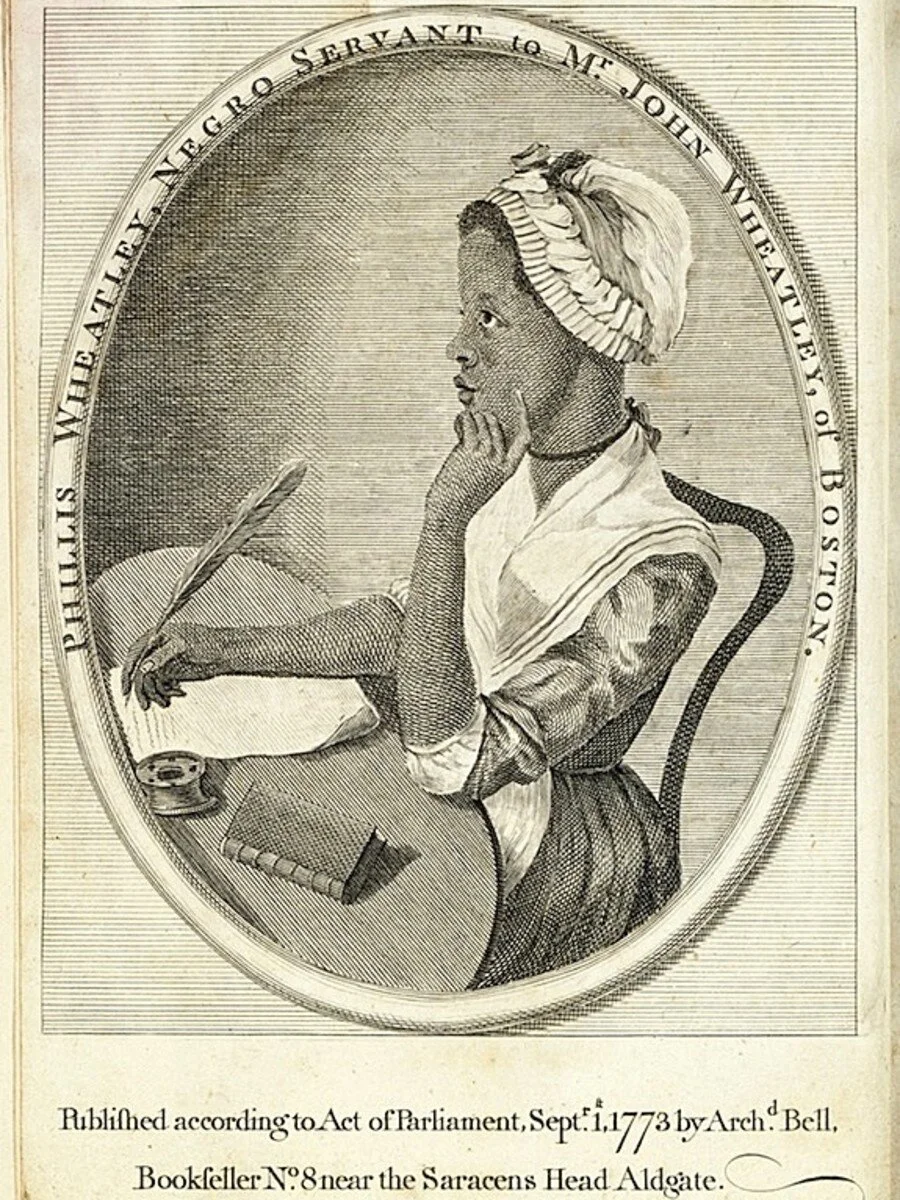Phillis Wheatley
Phillis Wheatley 1753 - 1784
A modern poetry class would be negligent to omit the work of Dr. Maya Angelou or Langston Hughes or Alice Walker. But those 20th century giants were inspired by the courage of Phillis Wheatley. Wheatley, born enslaved, was the first Black person (and one of the first women) to have a book of poetry published.
While Wheatley was born in Senegal, her name comes from both her enslaver John Wheatley, and the ship (transporting enslaved people) that she was kidnapped on before being brought to Boston. The ship was named the “Phillis.”
According to the Poetry Foundation, “Poems on Various Subjects revealed that Wheatley’s favorite poetic form was the couplet, both iambic pentameter and heroic. More than one-third of her canon is composed of elegies, poems on the deaths of noted persons, friends, or even strangers whose loved ones employed the poet. The poems that best demonstrate her abilities and are most often questioned by detractors are those that employ classical themes as well as techniques.”
Wheatley advocated America’s fight for independence. So much so, several Wheatley poems honored the Continental Army's commander, George Washington. Wheatley sent one of these pieces to the future president. This correspondence inspired Washington to invite Wheatley to his Cambridge, Massachusetts headquarters.
The following Wheatley poem is emblematic of her patriotism, and reverence for the [eventual] first President of the United States:
“To His Excellency, George Washington”
Celestial choir! enthron’d in realms of light,
Columbia’s scenes of glorious toils I write.
While freedom’s cause her anxious breast alarms,
She flashes dreadful in refulgent arms.
See mother earth her offspring’s fate bemoan,
And nations gaze at scenes before unknown!
See the bright beams of heaven’s revolving light
Involved in sorrows and veil of night!
Muse! bow propitious while my pen relates
How pour her armies through a thousand gates,
As when Eolus heaven’s fair face deforms,
Enwrapp’d in tempest and a night of storms;
Astonish’d ocean feels the wild uproar,
The refluent surges beat the sounding shore;
Or thick as leaves in Autumn’s golden reign,
Such, and so many, moves the warrior’s train.
In bright array they seek the work of war,
Where high unfurl’d the ensign waves in air.
Shall I to Washington their praise recite?
Enough thou know’st them in the fields of fight.
Thee, first in peace and honours,—we demand
The grace and glory of thy martial band.
Fam’d for thy valour, for thy virtues more,
Hear every tongue thy guardian aid implore!
One century scarce perform’d its destined round,
When Gallic powers Columbia’s fury found;
And so may you, whoever dares disgrace
The land of freedom’s heaven-defended race!
Fix’d are the eyes of nations on the scales,
For in their hopes Columbia’s arm prevails.
Anon Britannia droops the pensive head,
While round increase the rising hills of dead.
Ah! cruel blindness to Columbia’s state!
Lament thy thirst of boundless power too late.
Proceed, great chief, with virtue on thy side,
Thy ev’ry action let the goddess guide.
A crown, a mansion, and a throne that shine,
With gold unfading, WASHINGTON! be thine.
























